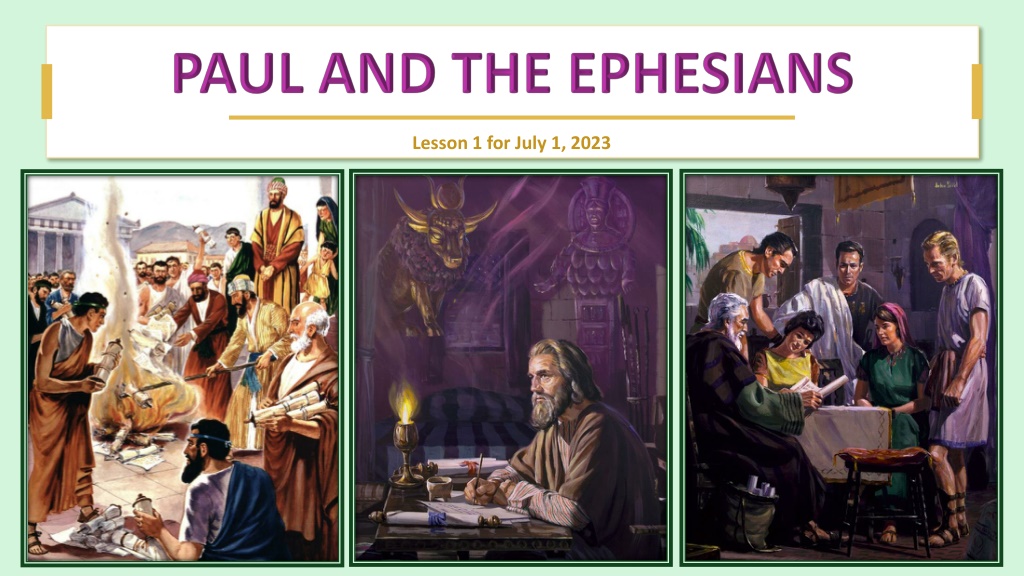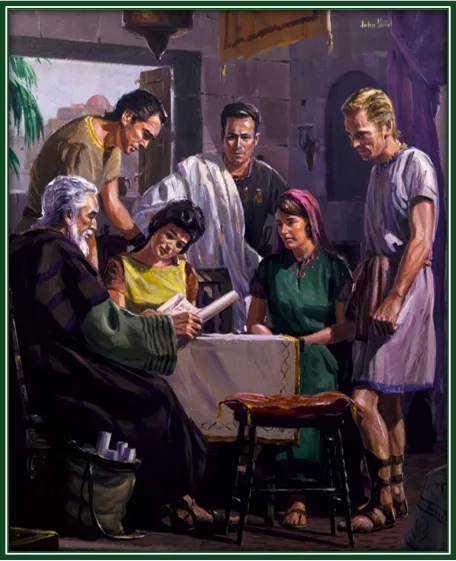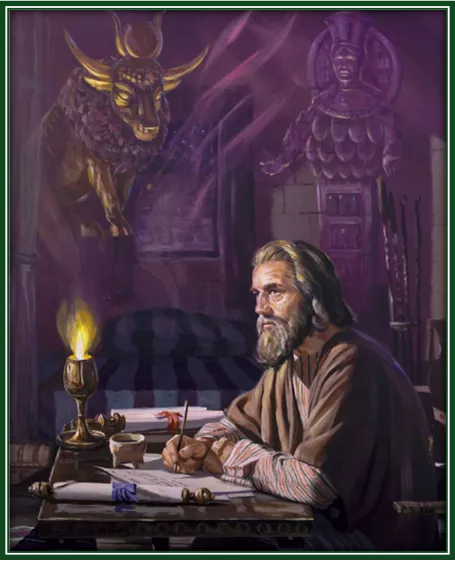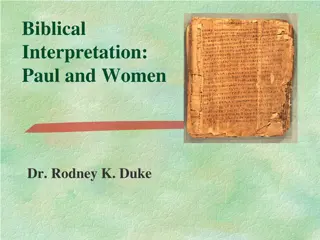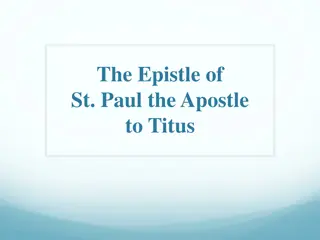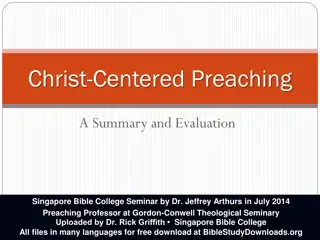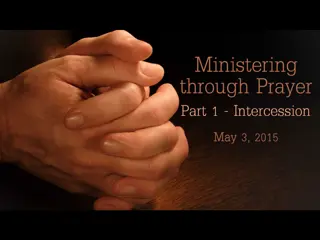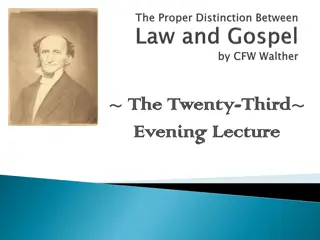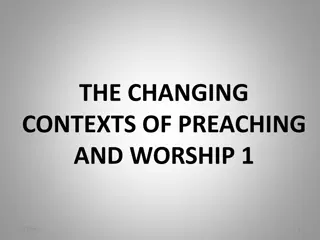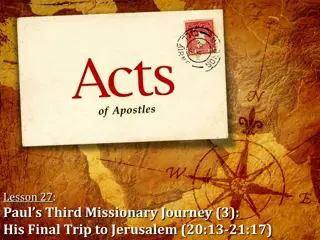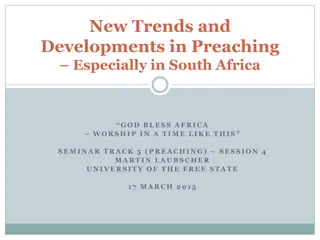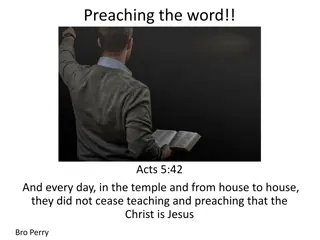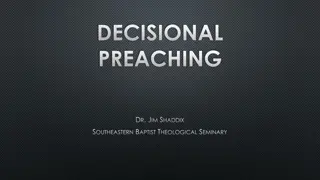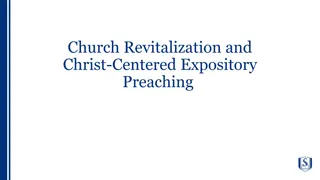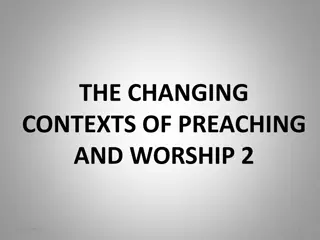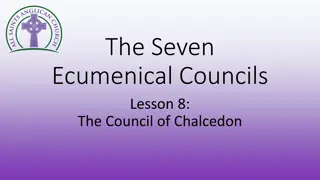The Impact of Paul's Preaching in Ephesus
Paul's significant presence and teachings in Ephesus led to a deep spiritual transformation among the Ephesians, sparking reactions that showcased the power of Jesus over evil forces. The city became a focal point of intense spiritual battles and transformation, culminating in the dramatic burning of books of magic by the local Christians as they embraced the supremacy of Jesus over all powers. The challenges and triumphs of Paul's ministry in Ephesus underscored the ongoing spiritual warfare and the victory of truth and light.
Download Presentation

Please find below an Image/Link to download the presentation.
The content on the website is provided AS IS for your information and personal use only. It may not be sold, licensed, or shared on other websites without obtaining consent from the author.If you encounter any issues during the download, it is possible that the publisher has removed the file from their server.
You are allowed to download the files provided on this website for personal or commercial use, subject to the condition that they are used lawfully. All files are the property of their respective owners.
The content on the website is provided AS IS for your information and personal use only. It may not be sold, licensed, or shared on other websites without obtaining consent from the author.
E N D
Presentation Transcript
Making known to us the mystery of his will, according to his purpose, which he set forth in Christ as a plan for the fullness of time, to unite all things in him, things in heaven and things on earth (Ephesians 1:9, 10)
Ephesus was one of the cities where Paul stayed for a long time to preach. The Ephesians were extremely interested in the Gospel. They even took drastic steps to abandon their old lifestyle. Paul said goodbye to the Ephesians sadly and warned them about a future apostasy among them. Some time after that, he felt the need to teach them and encourage them with a letter: the epistle to the Ephesians.
PAUL PREACHES IN EPHESUS And he came to Ephesus [ ] entered the synagogue and reasoned with the Jews. (Acts 18:19) In Paul s times, Ephesus was a prosperous city and the capital of Asia (the Roman province). The temple of Artemis (Diana for the Romans) was one of the seven wonders of the ancient world. Paul preached in Ephesus for a brief time by the end of his second missionary journey. He consolidated his work there during his third journey. Paul said goodbye to the elders of Ephesus in Miletus (Acts 20:17) Paul preached in Ephesus (Acts 18:19-22) Aquila, Priscilla, and Apollos preached (Acts 18:24-26) Paul preached for 3 years (Acts 19:1, 10, 22; 20:31) Paul wrote the epistle to the Ephesians in Rome (Acts 28:30; Eph. 3:1)
REACTIONS TO THE MESSAGE The Christians in Ephesus voluntarily burned books of magic with a total value of four million US dollars (Acts 19:19). Why did they do it (Acts 19:11-18)? They understood that Jesus is more powerful than Satan. They had to destroy any connection to Satan s powers in order to serve Jesus. Not everyone reacted this way. Demetrius made silver shrines of Diana, so his income was threatened. He thought that his business would go bankrupt if everyone accepted Christ (Acts 19:23-28). Paul had to leave Ephesus because of the turmoil that Demetrius provoked (Acts 19:29-41).
These treatises on divination contained rules and forms of communication with evil spirits. They were the regulations of the worship of Satan directions for soliciting his help and obtaining information from him. By retaining these books the disciples would have exposed themselves to temptation; by selling them they would have placed temptation in the way of others. They had renounced the kingdom of darkness, and to destroy its power they did not hesitate at any sacrifice. Thus truth triumphed over men's prejudices and their love of money. E. G. W. (The Acts of the Apostles, cp. 27, p. 288)
THE ADDRESSEES
Paul, an apostle of Jesus Christ by the will of God, to the saints who are in Ephesus, and faithful in Christ Jesus: (Ephesians 1:1) Paul wrote a letter (epistle). It was not a letter to a specific person, but to the church. It had to be read in public by Tychicus who carried it (Eph. 6:21-22). In that time, the church gathered in homes where several families came together to worship (See Phlm. 1). The assembled groups likely included members of the host household, slaves, clients (free persons who depended on the householder for support), and even customers. Paul included special messages for some of those groups in his letter.
I. Doctrinal section: A. Blessing (1:3-14). Blessed be the God and Father of our Lord Jesus Christ, who has blessed us with every spiritual blessing in the heavenly places in Christ (1:3) B. Prayer for the church (1:15-23). [I] do not cease to give thanks for you, making mention of you in my prayers (1:16) C. Unity among Jews and Gentiles (2:1-22). For He Himself is our peace, who has made both one, and has broken down the middle wall of separation (2:14) D. Revelation of the mystery of Christ (3:1-21). to know the love of Christ which passes knowledge; that you may be filled with all the fullness of God (3:19) II. Practical section: A. Unity through the gifts (4:1-16). for the equipping of the saints for the work of ministry, for the edifying of the body of Christ (4:12) B. Changing our lifestyle (4:17-5:21). that you put off, concerning your former conduct, the old man which grows corrupt according to the deceitful lusts (4:22) C. Practicing Christianity at home (5:22-6:9). Nevertheless let each one of you in particular so love his own wife as himself, and let the wife see that she respects her husband (5:33) D. The armor of the Christian (6:10-20). Put on the whole armor of God, that you may be able to stand against the wiles of the devil (6:11)
Some years after saying goodbye to the elders of Ephesus, Paul was imprisoned in a rented house in Rome (Acts 20:17, 36-38; 28:30). He thought that situation could discourage the Ephesians (3:13). Therefore, he wrote a letter in an exalted literary style, beautifully written, and with well-thought repetitions that would imbue his listeners/readers with spiritual truths. The Church as a body The Church as a building/temple He also included four metaphors to better explain the purpose of the Church: The Church as a wife The Church as an army
even when we were dead in trespasses, made us alive together with Christ (by grace you have been saved), (Ephesians 2:5) The main subject of the letter is noticeably clear. Paul mentioned Jesus 49 times in diverse ways (Jesus, Christ, Jesus Christ). He saves us (2:5) He makes us similar to Him to do good (2:10) He unites Jews and Gentiles (2:11-14) He makes sure we can reach the Father (3:10-12) Paul wanted to revive the spiritual commitment of the Ephesians. He reminded them that they were part of the Church which is the core of God s plan to unite everything in Christ. He lives in our hearts (3:17) He gives us spiritual gifts (4:7-8) He helps us to grow (4:15) He is our love example (5:2) He is the Lord we serve (6:5-6)
These messages [Pauls letters], written with a power not of man but of God, contain lessons which should be studied by all and which may with profit be often repeated. In them practical godliness is outlined, principles are laid down that should be followed in every church, and the way that leads to life eternal is made plain. E. G. W. (The Acts of the Apostles, cp. 45, p. 470)
